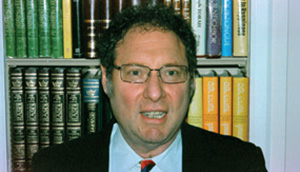
As religious Jews, our lives seem to be governed by the observance of laws, mitzvot. We go through life thinking such thoughts as: Is this product kosher? I can’t do this, it’s Shabbos; I have to put on my tzitzit; I can’t say that, it’s lashon hara; I must perform the mitzvah of etrog and lulav; I have a shidduch for her; I can’t eat that, it’s chametz.
We are so busy living the laws that we rarely think of the One Who gave the laws, the King Himself.
Why do we say, “What do the rabbis say about marriage?” instead of “What does God say about marriage?” Why do we say, “What does the Mishnah Berurah say about Shabbos?” instead of “What does God say about Shabbos?” Why don’t we ask, “How does God want me to behave at work, or with my wife, or when I do business?” Instead, we say the Shulchan Aruch gives us the answers.
If I were to ask you, “Who are you? What are you?” some of you might respond: “I am an Orthodox Jew,” or “I am a religious Jew” or “I am shomer Shabbos.” That’s not it! You are an eved Hashem, a servant of God. This idea may make us uncomfortable. It is easier to think we are Orthodox Jews or religious Jews than to think we are servants of God. But this is who we are. Twice daily when we say the Shema, we acknowledge that God is our King. At Sinai, 3,300 years ago, we swore to be His people and accepted His Law, the Torah. The same today. We are servants of God.
Even the word Adonai. It’s not God’s name. It means “my Master.” God is the Master of the universe. For each of us individually, He is “my Master.” Just think of that when you say Adonai.
Why are we almost embarrassed to say the word God in conversation, not only with non-Orthodox Jews and gentiles, but even within our community?
When someone greets us and asks, “How are you?” why do we often respond, “I’m fine, thank you.” Why are we reluctant to respond, “Thank God, I’m fine.”
When someone sneezes, we so rarely hear anyone respond anymore, “God bless you.” Yes, why not bring God into the conversation? Don’t we believe in His providence, His guidance and control of our affairs? When a Jewish acquaintance, religious or not, tells us of someone sick, why not say I’ll pray for your friend?
Yes, of course, God is hidden in this world. Even worse, in this very secular modern society we live in, we have learned not to talk about religion or God outside of our community. We are almost embarrassed. But it is for us to find Him, and to reveal His greatness in this world, and magnify His name. Isn’t that the purpose of being a Jew? Aren’t we a “mamlechet kohanim,” a kingdom of priests, whose purpose is to spread ethical monotheism, the knowledge of God, throughout the world?
When explaining the law to love God, the Rambam writes, “We must make God beloved among His creatures.” According to Chazal, this means that “the name of Heaven should become beloved through you. This aspect includes the requirement to mention God’s name, to teach strangers and gentiles about His ways, and we must call upon other people to love Him.”
I have donated blood dozens of times; the blood bank is always so desperate for donations. When I finish the donation, the nurses thank me gratefully. I usually reply that it was my pleasure but I really have no choice—it is really my responsibility as a religious person.
Why don’t we think in these terms? Why isn’t God constantly on our minds? Reb Nachman of Breslov developed the idea of hitbodedut, talking to God whenever we feel like, wherever we are. What a grand idea, to talk to God when washing the dishes, when driving a car, when going for exercise walks, thanking Him for what we have, asking Him for our needs, whatever we want to tell Him. He wants to hear from us.
The last words in Yishtabach and the bracha after eating minor foods, Borei Nifashot, are that God is the “Chai Ha’olamim,” the Life of the Universe. Wow, what an idea. God is the life of the universe.
When the Kotzker Rebbe would open his eyes every morning, he would begin with the words “I give thanks before You, living and eternal King, for returning my soul to me …” After saying only the first few words, “I give thanks before You,” Reb Mendel would pause and inquire: “But who is the ‘I,’ and Who is the ‘before You’?” And he fell silent.
Let’s think about God. A lot.
By Martin Polack
Martin Polack is a business analyst and has been involved in outreach and Jewish education for many years.










